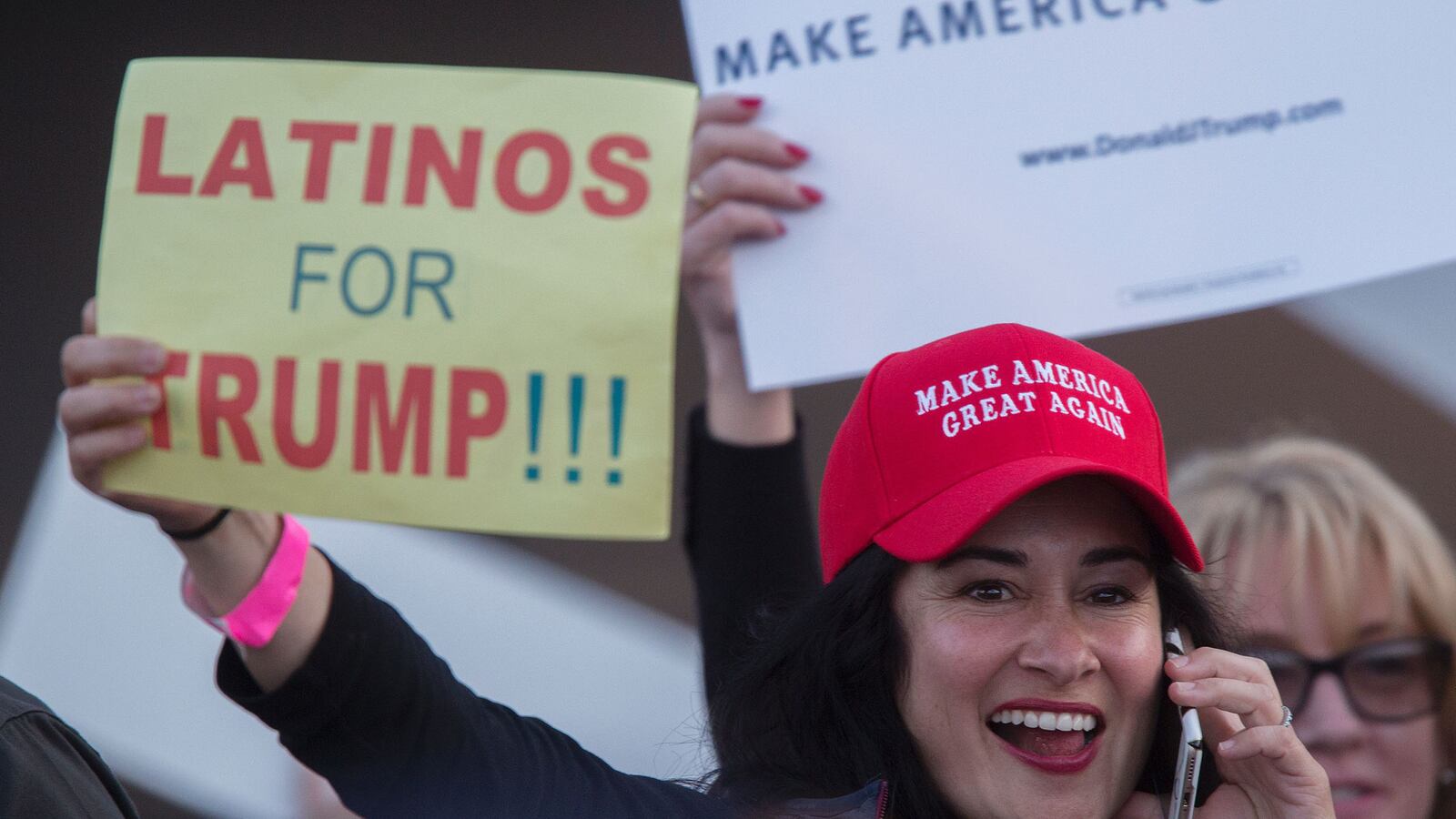As someone who had, just 24 hours earlier, asserted that Latino voters would turn out in droves for Hillary Clinton and help save the republic from Donald Trump, I spent Election Night with huevos rancheros on my face.
I was wrong. Actually, I was right but I was wrong.
I was right that Latinos did turn out big, at least in early voting. According to The Washington Post, Latinos accounted for a larger percentage of early voters than they did four years ago. This was especially true in critical battleground states like Colorado, Arizona, Florida, and Nevada. It was a slightly different story on Election Day when, according to CNN’s early exit polls, the overall electorate was about 11 percent Latino. That was almost identical to the 2012 figure, when Latinos accounted for 10 percent of the electorate.
And once they turned out, Latinos did throw most of their support to Clinton—about 71 percent, according to CNN.
But I was wrong that Latino voters would save the country by helping to elect Clinton and defeat Trump. Obviously that didn’t happen. The Republican nominee had a firewall of his own.
Election 2016 boiled down to a brutish tug-of-war between Latinos in the battleground states of the West such as Colorado and Nevada and working-class whites in the Rust Belt states like Michigan, Ohio, and Pennsylvania. And, in the end, Trump found enough white voters to offset losses with Latinos.
Never mind the country. Now that Trump has been elected the nation’s 45th president, it is Latinos who may soon need saving.
After all, it’s not enough to say that the relationship between the president-elect and America’s largest minority is tense or awkward. It’s downright poisonous. If Latinos have any hesitance about Trump, it’s only because many of them can’t figure out if they merely hate him or downright loathe the man.
That’s what happens when someone kicks off his presidential campaign by calling your Mexican grandfather a criminal and rapist, doubles down by implying that a U.S.-born federal judge whose parents were born in Mexico isn’t a full-blooded American, adds a threat to create a deportation force, and finishes up by allegedly calling a Latina beauty queen “Miss Housekeeping.”
Given the bad blood between Trump and Latinos, one of the biggest surprises on Election Night was that so many Latinos ended up voting for their tormentor. According to CNN’s exit polls, about 27 percent of Latinos voted for Trump. Exit polls from The New York Times put the figure at 29 percent.
This means that Trump did better with Hispanics than Bob Dole in 1996 (21 percent), and wound up comparable to Mitt Romney in 2012 (27 percent).
Que paso? I myself, on this page, have compared the concept of Latinos for Trump to the absurd idea of “Chickens for Colonel Sanders.” And yet here we are. What makes these people tick?
And what will a Trump presidency mean for the group of Americans that he first targeted, the group that hates him the most but which also seems to have given him a slight opening—say about 27 to 29 percent worth—to start a conversation?
As for Trump’s Latino support, I was shocked that it was so high. But, for months, I’ve been predicting that Trump would get about 20 percent of the Latino vote—which is a lot higher than many of his Latino critics thought possible.
To understand the concept of “Latinos for Trump,” the first thing you have to do is to accept that Latino voters aren’t monolithic, one-dimensional, or single-issue oriented. Like the Boston Irish of the 20th century, some of us may define ourselves first by our ethnicity while others just see ourselves as Americans. Period.
In my travels over the last 18 months, I’ve run across more than my share of Latino Trumpers. Here are a half-dozen things I’ve picked up about how they wound up in Trump’s column:
*They didn’t trust Hillary Clinton, and they couldn’t relate to her in any way.
*They were just as fed up with the establishment as other Americans, and just as easily seduced by an outsider like Trump.
*They were sick of politicians who don’t offend anyone because they don’t say or do anything consequential.
*They agreed with many of Trump’s ideas and policy proposals, and they were willing to overlook the wacky ones.
*When Trump portrayed Mexican immigrants as violent criminals, they weren’t bothered because they just assumed he wasn’t talking about them
*Many are ambivalent about undocumented immigrants anyway, and, in fact, some look fondly on concrete walls, tighter borders, and more deportations.
As for what a Trump presidency would mean to Latinos, the answer depends on whether both sides agree to bury the hatchet and work together on problems that plague this community. After a year and a half of fighting, Latinos might be in the mood for a little reconciliation. And it would go a long way toward establishing Trump as a leader who knew how to listen and adapt.
If he wanted to be really bold, Trump could pull a “Nixon goes to China” and propose the kind of immigration-reform package that activists will probably never get from Democratic politicians. That party is too beholden to organized labor, whose leaders and rank-in-file aren’t on the same page when it comes to offering legal status to undocumented immigrants. Of course, if Trump took on this issue, he would instantly run the risk of driving away the same working-class whites in Rust Belt states who put him in the White House. So he’ll probably tread lightly.
At this point, there are no obvious answers as to what this relationship between Trump and Latinos will look like over the next four years. This telenovela is still in development.
But whatever happens, don’t expect my community to fall to pieces. Perusing social-media sites on Election Night, I noticed a common theme in many postings. Simply put: Life goes on. We’ll endure. We’ll work through this together. This storm will pass.
That’s the Catholic fatalism in us. We don’t look to the political system for salvation, and so while election outcomes sometimes disappoint us—or even worry us—they never bring us to our knees. We just keep our head down and keep working.
Which brings me to a favorite family story. It’s the end of World War II—V-J Day—and my father’s aunt, Lupe, is overjoyed and excitedly running into the fields where my grandparents and their children are working. She calls out to my grandfather, in Spanish: “Roman! Want are you doing? Are you crazy? Haven’t you heard? The war is over!” Barely looking up from the row, my grandfather responds: “Yes, Lupe. I know. But, for the poor, the war never ends.” His war was for the survival of himself and his family, and he was focused on winning it.
And so it was poetic that, on election night, my 9-year-old son should call his grandfather, my dad, to ask if he was watching the results. My father—who, along with my mother, had voted for Hillary Clinton—said that he was. Then he tried to reassure the boy that, even with a President Trump, life will go on. He said, “Just study hard in school, and you’ll be able to do whatever you want in life. Change is good. And, you’ll see, this will be ok. We’ll be fine.”
These are the things that Latinos already know. We endure. The war never ends. Change is good. And we’ll be fine.






